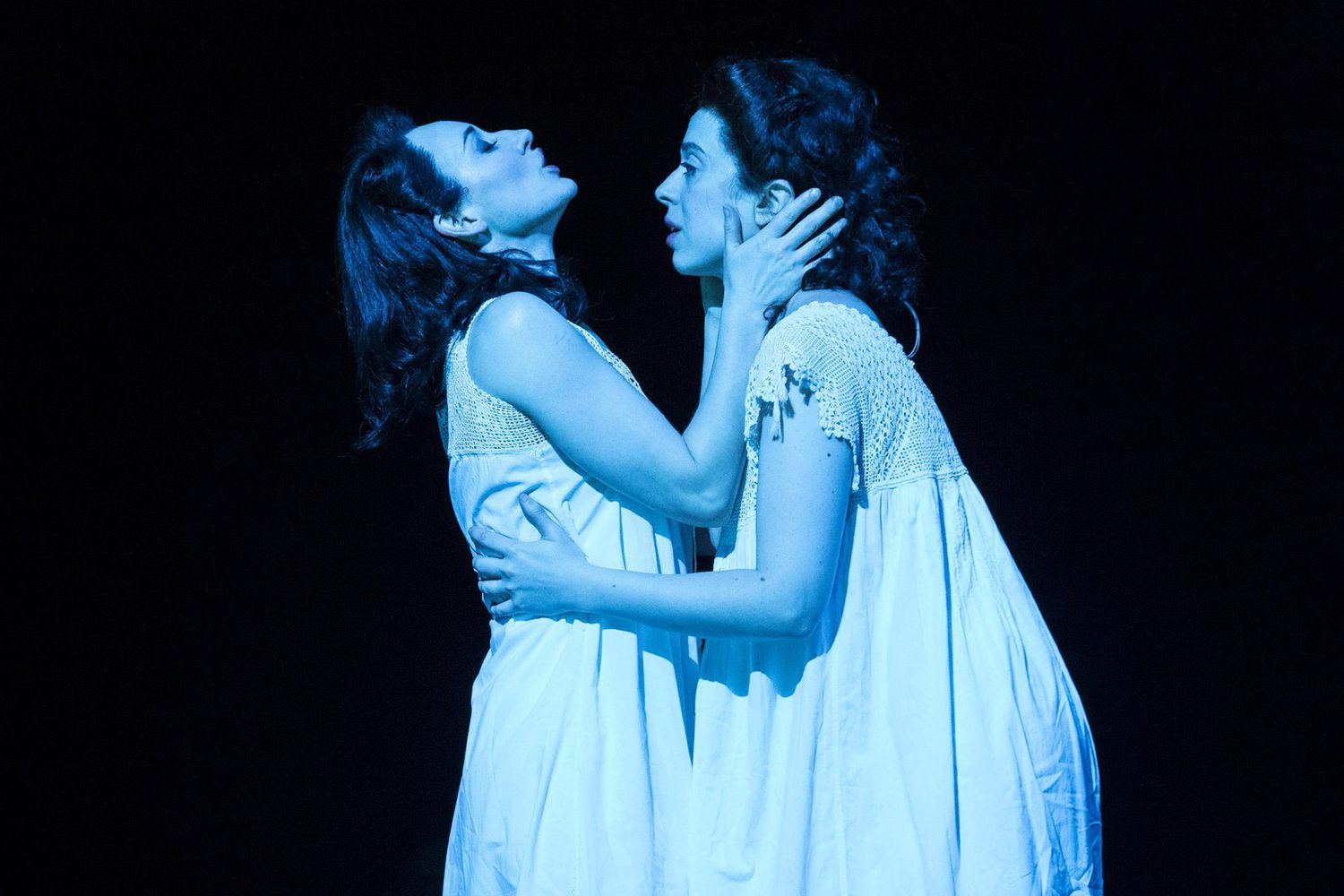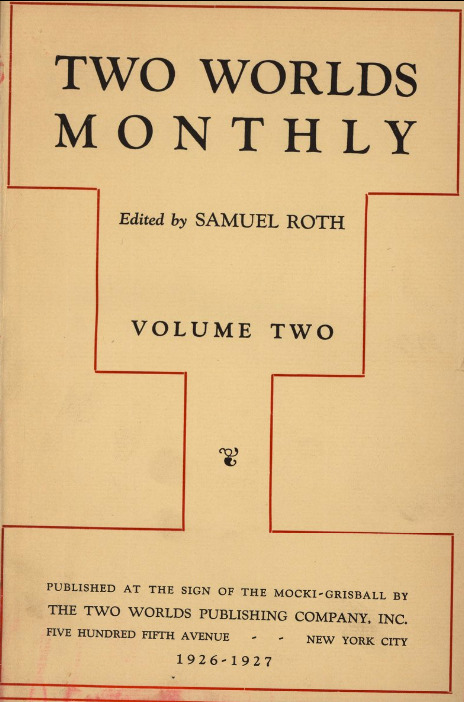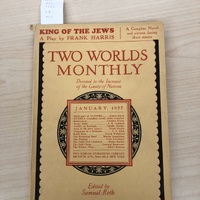Lina Maria Clevenger (Two Worlds Monthly Volume 2 Number 2)
Item Description
This Two Worlds Monthly magazine has a weathered off-white cover with black and red print. The edges are slightly worn but the book binding is still intact. The largest text size is the title, and underneath it, a subtitle reads: “Devoted to the Increase of Gaiety of Nations.” The boldest font however, and for me the most eye-catching, is at the top left hand and it reads: “King of the Jews”. A large emblem in the center contains a table of contents for the magazine, with “Volume Two Number Two” inscribed at the top. It’s about 250 pages long and 25cm tall. The bottom reads, “Edited by Samuel Roth” in italics and underneath says, “Price fifty cents” in capital letters. The inside contains ads for more magazines, short stories and poems all contentious or of varying levels of scandalous for the time, as well as the sixth installment of the pirated version of Ulysses.
Published: January 1927
Editor: Samuel Roth
Publisher: Two Worlds Monthly Publishing Company
Located: University of Victoria Special Collections
PHOTO CREDIT: Selena Wong, ENGL392 2022
Rationale
As I flipped through the magazine, I found the word “Jew” coming up repeatedly, as well as other buzzwords like “Rabbi”, Tanakhic references and traditionally Jewish names. My curiosity of whether the editor’s last name “Roth” was a Jewish last name or not (it is, Roth was an Orthodox Jew) led me on a rabbithole search towards some fascinating works and references of this man’s life. I was interested in the portrayal of Judaism as well as references to Jewish mysticism in Ulysses, and this magazine seems to offer a great portal into this analysis. In addition, 22 is my favorite number and it felt right since this is volume 2 number 2 of this magazine.
My research into the Two Worlds Monthly magazine and its editor, Samuel Roth, led me to a new understanding of Ulysses in terms of its reception with its contemporary Jewish readers. Joyce’s humanization of Jewish characters such as Bloom and Bella Cohen reflects a similar motive as seen in Jewish artists at the time, such as Sholem Asch, the playwright of the Yiddish play God of Vengeance, published in 1918. Hints of how Ulysses may have been received or intended to be received by Jewish audiences can be seen by comparing the play to the novel, and analyzing the works Ulysses was published alongside in the Two Worlds Monthly magazine, especially Volume 2 Number 2. The question that guides my research is how Joyce, like Asch and Roth, present an uncensored reality of Jewishness that was often not exposed out of fear of anti-semitism due to its scandalous nature. There are several themes of Ulysses engaged by this question: anti-semitism, Jewish life and sexuality.

Samuel Roth, Editor of Two Worlds Monthly
Unknown Photographer. Booktryst, 2013, http://www.booktryst.com/2013/04/the-most-notorious-publisher-in.html. Accessed 2022.
Literature Review
Gertzman, Jay A. “The Promising Jewish Poetry of a Pariah: Samuel Roth.” Studies in American Jewish Literature (1981-), vol. 28, 2009, pp. 55–72. JSTOR, http://www.jstor.org/stable/41206115. Accessed 19 Nov. 2022.
This source expands on the life and personal works of Samuel Roth, the editor of the Two Worlds Monthly magazine, and mentions how the magazine was Roth’s attempt to merge “two worlds”, the East and the West (Gertzman, 68) and help Jewish people absorb into Western culture. This point and his position as a Zionist Jew (56) is important to note when thinking about the intended audience of Two Worlds Monthly, and how the topic of Jewishness in Ulysses may have come across to Jewish readers, especially when published in Roth’s magazine.
Davison, Neil R., and Julius, A. James Joyce, Ulysses, and the Construction of Jewish Identity: Culture, Biography, and 'the Jew' in Modernist Europe. Cambridge University Press, 1996.
One of the most relevant parts of this book to my topic is the chapter on Ulysses, and the section wherein the author dissects the Circe chapter, as well as the Jewish symbolism portrayed. Bloom’s apparent degeneracy and kinky sexuality further reveals him as a complex human, one with vices and disgusting qualities. However he is also elevated through these acts to a renewed state of Jewishness (Davison, 227, 228). In addition, this book analyzes the representation of Jewishness in Ulysses beyond just the framework of anti-semitism, which I found to be the most common framework when researching the topic. Instead, symbolic analysis and understanding the Jewish characters seems to be central, and more similar to how Jewish readers would be thinking about the text, since it expands on ritual, tradition, and the experiences and emotions related to living in the world as a Jew.
Erdman, Harley. “Jewish Anxiety in ‘Days of Judgement:’ Community Conflict, Antisemitism, and the God of Vengeance Obscenity Case.” Theatre Survey, vol. 40, no. 1, 1999, pp. 51–74., doi:10.1017/S0040557400003276.
This article mentions the anxiety in Jewish communities surrounding the play, and the fear that the obscene acts, identities and choices of the characters would allow for an increase in anti-semitic behaviour. The fear of showing Jewish characters with flaws and vices made for a Rabbi in New York to be the one who denounced the play to the police, out of fear that negative representations of Jewish people would put them under threat of violence. This characterizes a feeling of unease that seems emblematic of the Jewish experience at the time, and is also seen in James Joyce’s Bloom, and is a result of Jewish people having to behave in a certain way and assimilate in order to avoid the threat of danger and potential violence, deportation or genocide.
Davison, Neil R. “Why Bloom Is Not ‘Frum’, or Jewishness and Postcolonialism in ‘Ulysses.’” James Joyce Quarterly, vol. 39, no. 4, 2002, pp. 679–716. JSTOR, http://www.jstor.org/stable/25477926. Accessed 19 Nov. 2022.
Why Bloom Is Not ‘Frum’ explores the representation of Bloom as a non-practicing, non-religious, apparently “bad” Jew, in the sense that he doesn’t follow tradition, keep kosher or attempt to be religious. The analysis of Bloom’s Jewishness will be important in my research because it will set a foundation for exploring this unusual portrait of Jewishness that can parallel that of some characters in the God of Vengeance play.
Knee, Stuart E. “GOD, ASCH AND VENGEANCE.” Studies in American Jewish Literature (1981-), vol. 16, 1997, pp. 61–73. JSTOR, http://www.jstor.org/stable/41205874. Accessed 19 Nov. 2022.
Knee’s article reviews the life of the God of Vengeance playwright, Shlomo Asch, and analyzes the cultural trends in European and American Jewish communities at the time of the release of the play, as well as the reception of challenging, progressive art and productions in those communities in the same era as the publication of Ulysses. Having insight into the realities of Liberal Jewish art at the time will help inform my analysis of how Ulysses may have been received by Jewish readership.

Shot from the 2015 play Indecent by Paula Vogel, a play about the play God of Vengeance and its reception. Captured here are the protagonist love interests in the famous rain scene.
Short Paper
Perhaps the most obvious theme related to Jewish readers of Ulysses is anti-semitism, considering how frequently it appears in the novel. The casualness of these comments could be seen by present-day readers as another out-dated white author expressing his own harmful views, but it reflects the reality of how casual anti-semitism was at the time, and the kinds of comments Jewish people would have to face on a regular basis. Anti-semitic readers may not gain some kind of moral reading from this and may actually be further entrenched in their views because of the casualness of these comments. However, it’s problematic to claim that Joyce was himself anti-semitic, since a decision to avoid this topic entirely would have also been harmful to Jewish communities because of the erasure of experience that that would be causing.
Bloom faces many anti-semitic comments from the citizen in the Cyclops chapter that he sometimes refutes and sometimes just lets slide. However, this experience prevents him from being a Dubliner and fully integrating into his surroundings. For example, the citizen says, “Sinn fein amhain! The friends we love are by our side and the foes we hate before us.” (524-525) referring to Bloom’s otherness in context of Irish national identity. Bloom is effectively excluded from the Irish identity, just as many other Jews in Europe and North America at the time. By including so much anti-semitic rhetoric, Jewish life at the time is represented realistically.
This is significant because Jewish readers of Ulysses through Two Worlds Monthly may relate this theme with their own experience, as well as enrich it with other stories in the magazine that also exhibit Jewish life. Considering he is a non-Jew, Joyce depicts deeply relatable experiences of Jewishness such as intergenerational connectedness and trauma, as well as the spiritual restrictions of religious institutions and guilt. My favorite example of this is in Bloom’s meeting with Bella Cohen. The last name Cohen means ‘priest’ in Hebrew, and given Bella’s dominant role in their BDSM session, she seems to take on a role of judging his Jewishness as well. In a sense, he is forced to confess to her (3042-3043) and later the spirits of the circumcised recite the Shema over Bloom (3228) in a ritual that seems to follow his symbolic death after his confession. The mix of sacred prayer and sex with a kinky madam in a brothel could be seen as incredibly profane, however the spiritual liberation that comes from this act is parallel (to a less explicit degree) to the play God of Vengeance. It’s the apparent indecency of the romance and sex between two Jewish women in this play that made it so controversial, however it’s this ‘profane’ love that liberates this women from the bonds of restrictive religious tradition and into spiritual liberation.
Samuel Roth also explores Jewish sexuality in some of the texts in the Two Worlds Monthly magazine I chose, such as “Rabbi Esra” (Roth,148), a story wherein a Jewish man goes to his rabbi to seek advice on love, and his rabbi gives him advice on sex, romance and women. “Dusky Ruth” (129) is an erotic story about a Jewish woman in this magazine, furthering the connection between sexuality and Jewishness also seen in Ulysses.
Roth, Asch and Joyce all express the reality of Jewish life through sexual expression that pushes against censorship as well as artificial, sanctified Jewish characters that are meant to prevent the spread of anti-semitic ideas, but end up dehumanizing those same characters. As a result of this as well as the exhibition of anti-semitism, Roth, Asch and Joyce present an uncensored reality that many Jewish readers may be intimately familiar with.
Statement of Contribution
The frequent anti-semitism of Ulysses can distract from other themes around Jewishness explored in the novel. My exploration of the reception of Ulysses by Jewish readers offers a new perspective on Bloom's experience in the novel, as well as on themes of sexuality, nationalism, spirituality and freedom. This question puts Joyce in line with some Jewish writers at the time, such as Sholem Asch, who sought the humanization of Jewish people in order to fight anti-semitism and find freedom, as well as the self-liberation found in sexual honesty. My work ties together the novel, the Two Worlds Monthly magazine (and its editor, Samuel Roth), a play contemporary to Ulysses and a Jewish perspective.

